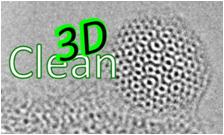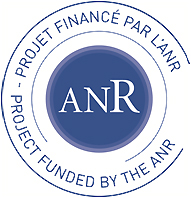ANR 3DCLEAN (2015/10 - 2020-10)

3D Catalytic Environmental Lab at the Nanoscale
![]() Visit the 3DCLEAN web site here
Visit the 3DCLEAN web site here
 (text visible on the web site of the ANR) In the context of the energetic transition, eco-friendly industrial strategy, sustainable growth and renewable energies, new catalysts are required in order to accelerate or guide reactions allowing more compounds to be industrially produced in a faster, purer, cleaner and less expensive way. Thus, in situ operando techniques are more and more requested to promote an efficient research and a better understanding of specific catalytic systems. Our project 3DCLEAN will be conducted over 3 and a half years (42 months): it intends to develop new combined in-situ Transmission Electron Microscopy (TEM) approaches for dynamic investigations of complex heterogeneous catalysts under environmental conditions in 3D and/or at atomic resolution. Environmental Electron Microscopy techniques are now available, either in a dedicated Environmental TEM (ETEM), or in a High Pressure Environmental Cell (HPEC) which can fit any TEM. In this context we aim at promoting new innovative experiments in a synergetic strategy combining complementary equipments available by the partners: a unique aberration-corrected ETEM installed in France (CLYM Lyon) and the first HPEC delivered in Europe at IPCMS Strasbourg. These experiments consist in (i) in situ fast tomography of ongoing reactions under gas pressure and temperature as permitted in an ETEM (optimized through adequate image processing and analysis), (ii) quantitative spectrometric analysis of gas reaction products during in situ catalysis (Residual Gas Analysis system coupled to the HPEC). These two objectives require specific accessories. Fast tomography during (slow) catalytic reactions, or at different stages of advancements while controlling the speed of the reaction, imposes a rapid acquisition of the tilting series strongly needed for a proper 3D reconstruction : a high-speed and highly sensitive camera is demanded, and further computer-based modules must be developed (acquisition scripts, deblurring/denoising algorithms, 2D/3D specific image processing). The analysis of gas reactants demands a RGA system coupled to the Environmental cell : this development will be done by the E-cell manufacturer in partnership with IPCMS.
(text visible on the web site of the ANR) In the context of the energetic transition, eco-friendly industrial strategy, sustainable growth and renewable energies, new catalysts are required in order to accelerate or guide reactions allowing more compounds to be industrially produced in a faster, purer, cleaner and less expensive way. Thus, in situ operando techniques are more and more requested to promote an efficient research and a better understanding of specific catalytic systems. Our project 3DCLEAN will be conducted over 3 and a half years (42 months): it intends to develop new combined in-situ Transmission Electron Microscopy (TEM) approaches for dynamic investigations of complex heterogeneous catalysts under environmental conditions in 3D and/or at atomic resolution. Environmental Electron Microscopy techniques are now available, either in a dedicated Environmental TEM (ETEM), or in a High Pressure Environmental Cell (HPEC) which can fit any TEM. In this context we aim at promoting new innovative experiments in a synergetic strategy combining complementary equipments available by the partners: a unique aberration-corrected ETEM installed in France (CLYM Lyon) and the first HPEC delivered in Europe at IPCMS Strasbourg. These experiments consist in (i) in situ fast tomography of ongoing reactions under gas pressure and temperature as permitted in an ETEM (optimized through adequate image processing and analysis), (ii) quantitative spectrometric analysis of gas reaction products during in situ catalysis (Residual Gas Analysis system coupled to the HPEC). These two objectives require specific accessories. Fast tomography during (slow) catalytic reactions, or at different stages of advancements while controlling the speed of the reaction, imposes a rapid acquisition of the tilting series strongly needed for a proper 3D reconstruction : a high-speed and highly sensitive camera is demanded, and further computer-based modules must be developed (acquisition scripts, deblurring/denoising algorithms, 2D/3D specific image processing). The analysis of gas reactants demands a RGA system coupled to the Environmental cell : this development will be done by the E-cell manufacturer in partnership with IPCMS.
With such tools, 3DCLEAN focuses on heterogeneous catalysis. Our purpose is to overcome existing scientific barriers in order to achieve innovations that can be used by industry. Rather than industrial catalysts, this task involves model systems which enable to vary parameters one by one (size or shape of nanoparticles (NPs), texture and nature of the support). Two systems of high industrial and economical interest will be studied : Pd NPs on alumina used in hydrogenation processes and Co-based NPs for the Fischer-Tropsch synthesis. The common objectives for these two systems are to follow the evolution of the nano-catalysts in real time inside the microscopes from both the point of view of structural, morphological and chemical changes (down to the nanometric range, which means directly at the scale of the nanoparticle size, and even at atomic resolution) and quantitative analysis of the gaseous reactants.
The experiments planed in the project are challenging; lots of assumptions exist concerning catalyst deactivation: sintering of particles, surface reconstruction, coking, surface oxidation by water produced during the reaction. Following the evolution in the two systems described previously directly during reactions in the microscope should bring valuable information and open new perspectives in terms of developing optimized systems through a better comprehension of elementary but complex processes. In this respect we have constituted a pluridisciplinary consortium of four partners having the recognized expertise to cover the major aspects of the study in science of catalysis (IFPEN), electron microscopy (MATEIS-CLYM and IPCMS) and image analysis (CREATIS). Non permanent people are requested: one 2 years post-doc and a PhD student; 2 Master internships are also demanded.
Contact:
Thierry EPICIER (thierry.epicier@insa-lyon.fr), coordinator
